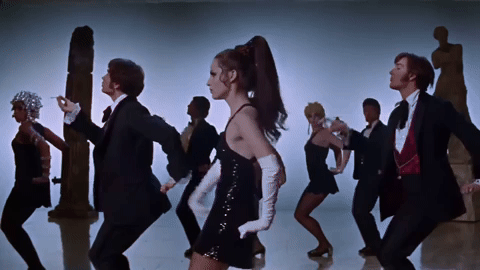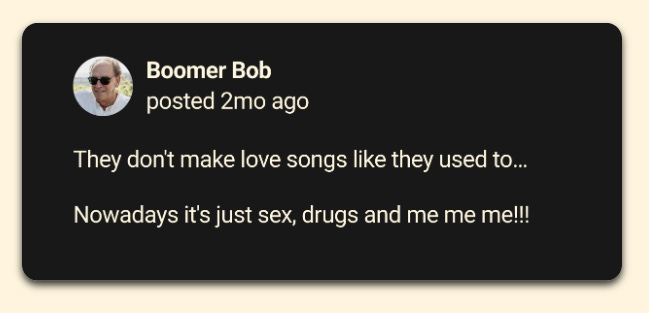🏷️✨The Nexialist #0199
urbanity | sweet charity | is the love song dying? | quantitative validation | nexus | cybernetics | a life without labels
welcome to your weekly shot of cyber-vitamins, the nexialist
hey, you! i hope this message finds you well. the nexialist is almost at the tn#200 and i’m just pretending to be very casual, but it’s an amazing accomplishment the fact i’ve been doing this for two hundred weeks, almost non-stop. i will probably talk more about it next week, but in the meantime, if you want/are able to show financial support for this event, a coffee (or more) —or a paid subscription) would be lovely. otherwise, share with those who you know would love this juicy weekly newsletter. this weekend, i’ll be going to london for the first time ever, for around 10 days, and i feel this kind of big-city anxiety (and i feel silly for feeling this way). wish me luck! 🍀✨
1 year ago » 💿✨The Nexialist #0147 : the beauty of degraded media | ab.solve | heaven knows | la_original.mp3 | speak-o-phone | oralitura | ai pin | best inventions of 2023 | future creatives report | life trends 2024
2 years ago » 🍆✨The Nexialist #0095 : the porn conversation | how tech is reshaping male masturbation | the origin of war | dreamer | strong | softness as a technology | straight men kissing | estás buenísimo | how qatar bought the world
3 years ago » 🌬✨The Nexialist #0045 : Eroticism in Hard Times | Aphantasia | Onlyfans ft. Museums | Pompeii Erotica | Army of Lovers | World Wide Wood | Four C-words | Ideas Report 2021 | New Shapes | Opening Doors & Open Spaces
🌃urbanity
Urbanity (/ˌɜːrˈbænɪtiː/) may refer to suavity, courteousness, and refinement of manner, or to urban life. It represents characteristics, personality traits, and viewpoints associated with cities and urban areas. People who can be described as having urbanity are sometimes referred to as citified. The word is related to the Latin urbanitas with connotations of refinement and elegance, the opposite of rusticus, associated with the countryside. In Latin the word referred originally to the view of the world from ancient Rome. […]
In language, urbanity still connotes a smooth and literate style, free of barbarisms and other infelicities. In antiquity, schools of rhetoric flourished only in the atmosphere of large cities, to which privileged students flocked from smaller cities in order to gain polish.
this week, i was looking for english translations for the portuguese word delicadez, as delicacy is not really the translation. google offered me a huge list, including the unexpected word urbanity. i had never thought about the origin of the word, but it blew my mind to know it has this (imo) forgotten meaning. to think we’ve come a long way and city-life can be actually quite harsh (and not courteous/refined) for many people.
brainsparks: envisioning cities (tn#183), this city will kill me (tn#144), urban futures (tn#179), fetish, glamour & grammar (tn#75)
🚬sweet charity
i had this video waiting to be posted for months, after my friend roel showed it to me. bob fosse’s sweet charity (1969) is iconic and referenced. i somehow imagined how urban manners might be seen by someone who never saw them before. meticulous, curious, silly. reminded me of authentic artificiality.
brainsparks: authentic artificiality (tn#130), sad and pale paper (tn#113)
💔is the love song dying?
as per usual, pudding.cool is bringing us data-driven quality content. in this edition they explore how love songs are (or not) dying in an immersive/interactive journey. david mora and michelle jia analysed 5,100 billboard top 10 hits from 1958 to september 2023 to help us answer boomer bob. they are very good and letting us decide what is considered a love song. only serenades? heartaches too? is a song about pursuing a fling a love song? how about overcoming heartbreaks? complicationships? sexual confidence? how about self-love (hello, miley cyrus’ flowers!).
spoiler alert! love songs are dying if you only consider love songs the traditional serenades. but depending on what you consider love songs (which you can filter), the answer might be different. i was surprised to see “sexual confidence” and “serenade” hits having decresed over the past 2 decades, while “heartaches,” “it’s complicated” and “self-love” songs having increased. and that movement says a lot about our times.
brainsparks: same gender lyrics (tn#27), the state of dating (tn#191), situationships (tn#86), hallucinationship (tn#194), social health (tn#179)
🥰quantitative validation
mentioned this term on rabbit holes #97 and i had to click. julia alexander wrote it for her posting nexus blog, how we’ve got so used to gamification that it has affected how we do our hobbies and pastimes, how joy shifted into competition. i would even extend this quantitative validation erosion to our own self-confidence and self-worth, such as likes/engagements in a cute selfie or something we posted. As qualitative validation all but erodes, the only form of validation left is quantitative. Miles run. Books read. Movies watched. Songs streamed. Beers bought. Fantasy wins. We have turned competition into connection because it’s the only way we’ve learned that we can get attention — and when you see a continuous decline in relationships outside of your phone because spaces continue to disappear, you’ll cling to whatever you can to feel like you belong to a larger world. That’s without taking into account how the platforms themselves use gamifying tactics, preying on emotional and physical impulses and serotonin boosts, to ensure that the little device in our hands connecting us to those competitive blurry faced strangers, feels more important than trying to form quality connections elsewhere.
brainsparks: superindustry of the imaginary (tn#28), hyperindustry of the atificial imaginary (tn#118), fracking eyeballs (tn#150)
🕊️nexus
recently my boyfriend juan (thank you, bb!) got me a copy of yuval noah harari’s nexus: a brief history of information networks from stone age to a.i. (the perfect present for a nexialist, if you ask me ;) i’m reading it little by little as i’ve been quite sloppy with my offline reading time. so far i’m impressed with the questions he poses, for instance on the naïve vs. historical view on information. does more information always mean more wisdom and more power?
i will bring more ideas about it when i finish it, but for now i’m happy bt published an interview about the book and its themes with yuval (the full 1hr15min interview is here). i love his analogies: when learning how to drive (or ski) you first learn how to break / stop, not to speed it.
brainsparks:
👨🏻💻cybernetics
this link was shared in the
group: ‘want to win the AI revolution? study up on cybernetics’ by jan krikke. i had never thought about it that way, but cybernetics can fit in the realm of media literacy/digital literacy. if we could learn these building blocks, it might help demistify ai.In the K-12 context, understanding this lineage provides students with historical insight and a logical structure for grasping computational processes. When students learn that AI is rooted in binary-Boolean operations, it demystifies complex concepts by showing how simple building blocks—binary systems and logic gates—come together to create complex programs.
These ideas also make AI’s “thinking” process feel more tangible and less opaque. Rather than seeing AI as an almost magical intelligence, students can begin to understand AI as a system of structured rules, following the same logic that powers computers, and learn how AI decision-making builds upon these principles.
Cybernetics is not only about computing; it’s about control and feedback. The term originates from the Greek kybernetes, meaning “steersman” or “governor,” emphasizing the idea of systems regulating themselves based on input and feedback.
brainsparks: the hidden networks of everything (tn#126), new words for new worlds (tn#111), ai: hype or the real deal? (tn#149), memes, emoji & the rosetta stone (tn#9)
🏷️a life without labels
the algorithm pushed me this short bt interview with ryan holiday. i’m not very familiar with him or his work (he owns a hip bookshop) but he said something that does not leave my mind: doing the verbs, not trying to be the nouns. of course, there is a layer of privilege we can’t ignore, but it is nonetheless helpful.
the title caught me because i thought he would talk about relationship/sexual preferences, but he’s more in the work/hobby realm in his observations. i can relate to that with my flaccid zine, which has been in the making for around 10 years, mainly because i was limiting myself. for a long time i had these thoughts that i did not have the skills to do something like this, but i started working on them: reading about it, writing, designing, etc. especially today with so many resources available, it might be possible to let go of these labels.
see you next week, cyber-urban-cuties🫀✨
❓Wait, what is a Nexialist?
🔎If you want to see what I’ve already posted, visit the archive and use the search engine. Even I do that a lot.
💌I want to know what you think/who you are! Your feedback is highly appreciated; you can e-mail me or fill in this short survey. Thank you! 🙏🏻
🔌Let’s Collab?
I truly believe innovation comes from bringing improbable areas together, and that’s why I called this project The Nexialist. Some sectors are known to be self-referencing and hermetic. Sometimes, teams are on autopilot mode, focused on the daily grind, which hinders innovation. As a Nexialist, I like to burst these bubbles, bringing references from different areas, and maintaining teams inspired and connected to the Zeitgeist.
I offer inspiration sessions called Brainsparks, creative desk research (Zeitgeist Boost), Plug’n’Play deals for workshops and sprints, and other bespoke formats. If you want to know more about this, send me an e-mail with your challenge(s) and we can figure something out together. Check out my website and some work I’ve done below:







